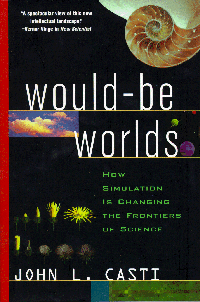John Casti: "Why the Future Happens: Socionomics and the Science of Surprise"
Teleconferenced lecture to be held on Thursday April 20, 2006, 18:15.
Room D 16.2, Main Building, ETH Zurich. Event broadcasted from SHARE / Consulate of Switzerland , in Cambridge, Massachusetts.

This talk presents the implications of recent work on wave-like patterns in social phenomena for characterizing and predicting the flow of human events and actions, such as the outcome of political elections, trends in films and fashion, the outbreak of war, and the rise and fall of civilizations. The talk will show that all such collective human social events are generated by the changing social mood in a population, and that the changes in this mood follow patterns that are predictable. This fact has led to the emerging field of socionomics, which is nothing less than a "science of surprise". The story of the development of socionomics and its mode of forecasting social trends will be presented through numerous examples and stories, as well as illustrations of how socionomics provides a systematic, coherent tool for predicting changing trends in the overall social mood. The talk shows that these trends exist on all time-scales---minutes to decades---and can be measured by the gyrations o financial market indexes, such as the Dow Jones Industrial Average. Thus, the talk illustrates how to actually predict "surprises", the turning points in social trends. So in a very real sense socionomics provides what amounts to a telescope for seeing the shape of the future.
The "take-home" message from this talk is twofold: The future is predictable in
exactly the same probabilistic way that the weather is predictable, and that thoughts cause action and events---not vice-versa! Individual human thoughts are gathered together through the herding instinct hard-wired into every mammalian brain. These individual moods are like "bets" people place about the future. The bets then self-organize into an overall collective social mood, which after an appropriate period of time depending on the nature of the event, gives rise to things like wars, election results and styles in popular culture. This line of argument is exactly the opposite of that usually put forth by academic thinkers, Op-Ed writers, intellectual commentators, and other assorted pundits in their attempts to "explain" the flow of human events. The conventional explanations mostly go from "actions ? moods ? thoughts" instead proceeding in the "socionomic direction", which puts things exactly the other way around.
John Casti is Research Fellow at the WZW (Wissenstransfer für Wien) in Vienna.
